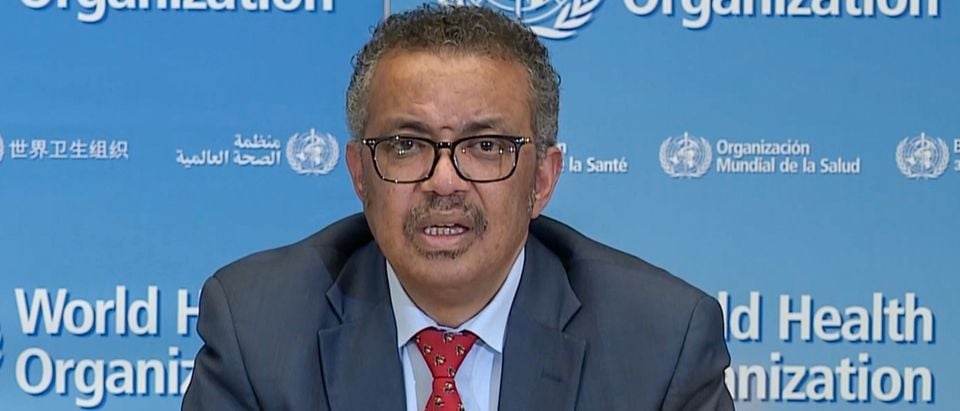- World Health Organization Director-General Tedros Ghebreyesus said Thursday that all theories behind the origin of COVID-19 warrant further investigation.
- His comments come after a WHO panel investigating the pandemic’s origins in Wuhan said Tuesday the theory that COVID-19 could have accidentally leaked from a lab is “highly unlikely” and not worth further investigation.
- “I want to clarify that all hypotheses remain open and require further study,” Tedros said Thursday.
World Health Organization Director-General Tedros Ghebreyesus said Thursday that all theories into the origin of COVID-19, including the lab leak hypothesis, merit further investigation.
Tedros’s statement came two days after a joint WHO-China panel investigating the origins of the pandemic in Wuhan said the lab leak theory was “extremely unlikely” and not worth exploring any further. The panel instead recommended that further research be conducted into China-favored theories such as the possibility that the virus could have been imported into Wuhan from other countries.
“Some questions have been raised as to whether some hypotheses have been discarded,” Tedros said Thursday. “I want to clarify that all hypotheses remain open and require further study.”
Ian Birrell, a reporter for the British news website UnHerd, said Tedros’s statement amounted to a “screeching U-turn on the lab leak theory” his own organization had dismissed two days prior.
.@who has made a screeching U-turn on the lab leak theory it dismissed at yesterday’s press conference
‘Some questions have been raised as to whether some hypotheses have been discarded. I want to clarify that all hypotheses remain open and require further study,’ says @DrTedros
— Ian Birrell (@ianbirrell) February 11, 2021
The WHO panel investigating the origins of the COVID-19 pandemic in Wuhan has not yet released their report explaining why they believe it’s highly unlikely that the Wuhan Institute of Virology, which was studying bat-based coronaviruses prior to the pandemic, shouldn’t be investigated any further.
Deadly viruses have a history of escaping from Chinese laboratories. The first SARS virus escaped twice from the Chinese Institute of Virology in Beijing in 2004.
The WHO investigation into the origins of COVID-19 hit the ground in China approximately a year after the first case was reported in Wuhan.
The panel’s investigation in China has been shrouded in secrecy, according to CNBC.
The WHO report is expected to be released “in coming days,” WHO spokesman Tarik Jasarevic told the Daily Caller News Foundation.
Members of the scientific community and President Joe Biden’s administration criticized the WHO’s panel’s conclusion that no further resources should be dedicated to investigating the lab leak theory.
“The WHO mission was a charade. It has no credibility. Its members were willing–and, in at least one case, eager–participants in disinformation,” Rutgers University professor of chemical biology Richard H. Ebright told the DCNF.
State Department spokesman Ned Price said Tuesday that the Biden administration will not draw any conclusions on the WHO panel’s investigation until they release their full report. (RELATED: WHO Investigation Contradicts State Department Report, Suggests COVID-19 May Have Started In Italy)
The sole U.S. member of the WHO panel, Dr. Peter Daszak, said Tuesday he was “disappointed” in Price’s comments and said in a tweet that U.S. intelligence on the origins of COVID-19 shouldn’t be trusted and the White House should blindly trust the panel’s conclusion before reviewing their report.
Well now this????. @JoeBiden has to look tough on China. Please don’t rely too much on US intel: increasingly disengaged under Trump & frankly wrong on many aspects. Happy to help WH w/ their quest to verify, but don’t forget it’s “TRUST” then “VERIFY”! https://t.co/ukaNAkDfEG
— Peter Daszak (@PeterDaszak) February 10, 2021
Daszak’s inclusion on the WHO panel has come under fire as well. He worked closely with the Wuhan Institute of Virology and its top bat-based coronavirus researcher Shi Zhengli prior to the outbreak.
Daszak discussed how easy it was to manipulate bat-based coronaviruses in labs during a podcast interview just weeks before the first known cases of COVID-19 were reported in Wuhan. Proponents of such experiments, also known as gain of function research, say it’s a useful tool in creating treatments for future outbreaks, but some virologists say it’s too risky, as it poses the risk of introducing new viruses into the human population.
Daszak is the president of the nonprofit group EcoHealth Alliance, which funneled nearly $600,000 from a U.S. taxpayer-funded grant to the Wuhan Institute of Virology between 2014 and 2019 as part of a research project studying coronaviruses from Chinese bats, according to The Wall Street Journal.
Shi, known as the “bat lady” in China, told the Scientific American in March that she lost sleep worrying that the virus could have leaked from her lab in Wuhan after she first learned of the outbreak in December 2019.
All content created by the Daily Caller News Foundation, an independent and nonpartisan newswire service, is available without charge to any legitimate news publisher that can provide a large audience. All republished articles must include our logo, our reporter’s byline and their DCNF affiliation. For any questions about our guidelines or partnering with us, please contact licensing@dailycallernewsfoundation.org.












